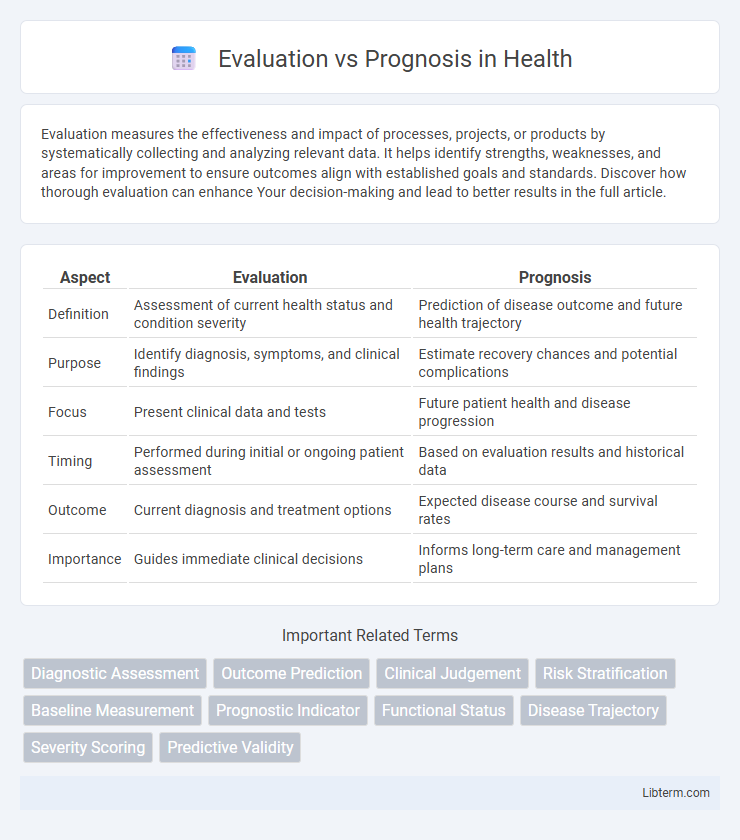Evaluation measures the effectiveness and impact of processes, projects, or products by systematically collecting and analyzing relevant data. It helps identify strengths, weaknesses, and areas for improvement to ensure outcomes align with established goals and standards. Discover how thorough evaluation can enhance Your decision-making and lead to better results in the full article.
Table of Comparison
| Aspect | Evaluation | Prognosis |
|---|---|---|
| Definition | Assessment of current health status and condition severity | Prediction of disease outcome and future health trajectory |
| Purpose | Identify diagnosis, symptoms, and clinical findings | Estimate recovery chances and potential complications |
| Focus | Present clinical data and tests | Future patient health and disease progression |
| Timing | Performed during initial or ongoing patient assessment | Based on evaluation results and historical data |
| Outcome | Current diagnosis and treatment options | Expected disease course and survival rates |
| Importance | Guides immediate clinical decisions | Informs long-term care and management plans |
Understanding Evaluation and Prognosis
Evaluation involves systematically collecting and analyzing patient data to determine the current health status, including diagnosis and treatment needs. Prognosis predicts the likely course and outcome of a disease based on evaluation results, patient history, and clinical evidence. Accurate understanding of both processes enhances clinical decision-making and patient care outcomes.
Definitions: What is Evaluation?
Evaluation refers to the systematic process of collecting, analyzing, and interpreting data to determine the effectiveness, value, or quality of a service, program, or individual performance. It involves setting criteria, measuring outcomes, and making informed judgments based on evidence. Evaluation aims to provide actionable insights for decision-making and improvements in various fields such as healthcare, education, and business.
Definitions: What is Prognosis?
Prognosis refers to the predicted outcome or course of a disease, including the chances of recovery, progression, or survival based on clinical data and patient-specific factors. It provides an estimate of future health status by analyzing symptoms, diagnostic results, and treatment responses. Evaluation, in contrast, involves assessing the current condition or status of a patient through examination and diagnostic tests without forecasting future outcomes.
Key Differences Between Evaluation and Prognosis
Evaluation involves the systematic assessment of a patient's current condition using diagnostic tools, clinical tests, and observations to determine the severity, nature, and causes of a problem. Prognosis predicts the likely course, outcome, and potential for recovery or complications based on evaluation data, patient history, and statistical outcomes. Key differences include evaluation focusing on present status and measurement, while prognosis estimates future health trajectories and informs treatment planning.
Role of Evaluation in Clinical Decision-Making
Evaluation plays a critical role in clinical decision-making by systematically gathering and analyzing patient data to identify health issues and guide treatment plans. It employs diagnostic tests, patient history, and physical examinations to inform evidence-based interventions and monitor therapeutic outcomes. Effective evaluation ensures precise clinical judgments, optimizing patient care quality and resource allocation.
Importance of Prognosis in Patient Care
Prognosis plays a crucial role in patient care by providing predictions about the likely course and outcome of a disease, enabling tailored treatment plans and informed decision-making. Accurate prognosis helps healthcare providers prioritize interventions, allocate resources efficiently, and set realistic expectations for patients and families. Unlike evaluation, which assesses current health status, prognosis guides long-term management and improves overall quality of care through anticipatory strategies.
Methods and Tools for Effective Evaluation
Evaluation relies on structured methods such as standardized tests, observational checklists, and diagnostic interviews to systematically assess current abilities or conditions, ensuring accurate identification of client needs. Prognosis utilizes predictive models, statistical risk assessments, and longitudinal tracking tools to estimate future outcomes based on identified variables and historical data trends. Effective evaluation integrates evidence-based instruments like psychometric scales and functional assessments to provide a reliable foundation for intervention planning and informed prognosis.
Factors Influencing Prognosis Accuracy
Evaluation relies on collecting clinical data and diagnostic tests to assess current health status, while prognosis predicts the likely disease outcome based on that evaluation. Factors influencing prognosis accuracy include disease stage, patient age, comorbidities, genetic markers, and treatment response variability. Advanced predictive models incorporating biomarkers and machine learning algorithms improve prognosis precision by analyzing complex interactions among these variables.
Integration of Evaluation and Prognosis in Practice
Evaluation and prognosis are critical components in clinical decision-making, where evaluation involves systematic assessment of patient data and prognosis predicts future health outcomes based on that assessment. Integrating evaluation and prognosis enhances personalized treatment plans by combining current symptom analysis with predictive modeling of disease progression. This integration supports evidence-based interventions and improves patient management through continuous monitoring and adjustment of therapies tailored to evolving prognostic indicators.
Impact on Patient Outcomes: Evaluation vs Prognosis
Evaluation provides a comprehensive assessment of a patient's current health status, guiding immediate clinical decisions and interventions that directly influence patient outcomes. Prognosis offers predictions about disease progression and expected outcomes, enabling personalized treatment planning and informed patient counseling to improve long-term health results. Both evaluation and prognosis are critical for optimizing patient care, as accurate assessments paired with reliable forecasts enhance therapeutic effectiveness and quality of life.
Evaluation Infographic

 libterm.com
libterm.com